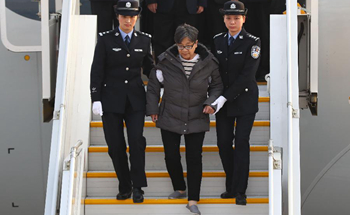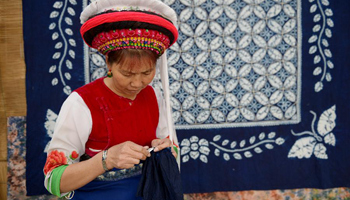RIO DE JANEIRO, Nov. 16 (Xinhua) -- "No one has ever done this, and I would like to be the first person to try it," Qiao Jianzhen said with a smile on her face, speaking of her dream of spreading a love of Mandarin in the famous Brazilian city.
The 47-year-old Chinese woman intends to extend her dream from classrooms for higher and adult education to local middle schools.
Qiao, the China-side president of a Confucius Institute, has a 30-year plan to turn as many Brazilians as possible into experienced "China hands" and advocates for closer China-Brazil relations.
This is an ambitious transplanted version of her former dream. Born into a family boasting generations of teachers, she has regarded education as her lifetime vocation. To run a private school realizing her educational ambitions was her plan after retiring from China's Hebei Normal University.
However, a surprise opportunity for further studies in Portuguese took Qiao eventually to the Confucius Institute at the Pontifical Catholic University of Rio de Janeiro in 2012.
"Localization is a must to make Mandarin teaching sustainable for the institute, which should serve as a starting point to reach out to middle schools," she said, adding that long- and medium-term programs are needed for this.
The idea came after a lot of brainstorming due in part to her headaches of trying to find a good local interpreter for cultural events, despite the fact that China is Brazil's largest trading partner, and Brazil China's largest trading partner and investment destination in Latin America.
Increasingly closer economic and trade ties between the two countries prompted by China's Belt and Road Initiative are leading more and more Brazilians to Mandarin courses. It also hurts Qiao to see that the classes the institutes offer cannot suffice to sustain the interest of most Brazilians, who often go away after a beginner's course.
However, Qiao has taken a large first step to achieve her ambition.
As a result of her efforts supported by the Chinese government and her alma mater, the first Brazilian high school that offers a bilingual curriculum in Portuguese and Mandarin opened in February 2015 in Niteroi, a city lying across Guanabara Bay from Rio.
More than 600 applications beat an enrollment plan of 72 students, even though the school adopts a tough all-day system which is unusual for the South American country.
On top of a mandatory Mandarin class every day, calligraphy, Hulusi folk music, table tennis and shuttlecocks are among the Chinese elements in the school, providing students with an emotional link to the Chinese culture.
Qiao said she feels very happy and highly rewarded to see that the school has made a difference in the students' lives.
For example, Andre Muhaisen da Corte, a child with autism, is no longer a silent onlooker of cultural programs but now an active participant. His paper-cuts brought his mother to tears as it was the first gift he made for her.
He is now one of the school's top Mandarin speakers, Qiao said.
Moreover, Qiao helped turn a 16-year-old soccer fan who reads little into a hardworking Mandarin learner. She let Guilherme Santos know that attending regular soccer trainings and a Chinese soccer camp would be possible only if he passed the second-level HSK Mandarin examination.
The milestones achieved by Santos and other students have encouraged Qiao to make further plans for the school children, such as preparations for their possible future study in China.
"During perhaps the last three decades in my life, I hope I can see them grow into cultural envoys and friends of China," said Qiao, who is considering starting files to follow the progress made by her students in their studies and future careers.
In 2014, Qiao became the first foreigner to be awarded a labor medal by the Brazilian government. This was for her outstanding contribution to cultural exchanges between China and Brazil.
"It has been a labor of love," she said.










